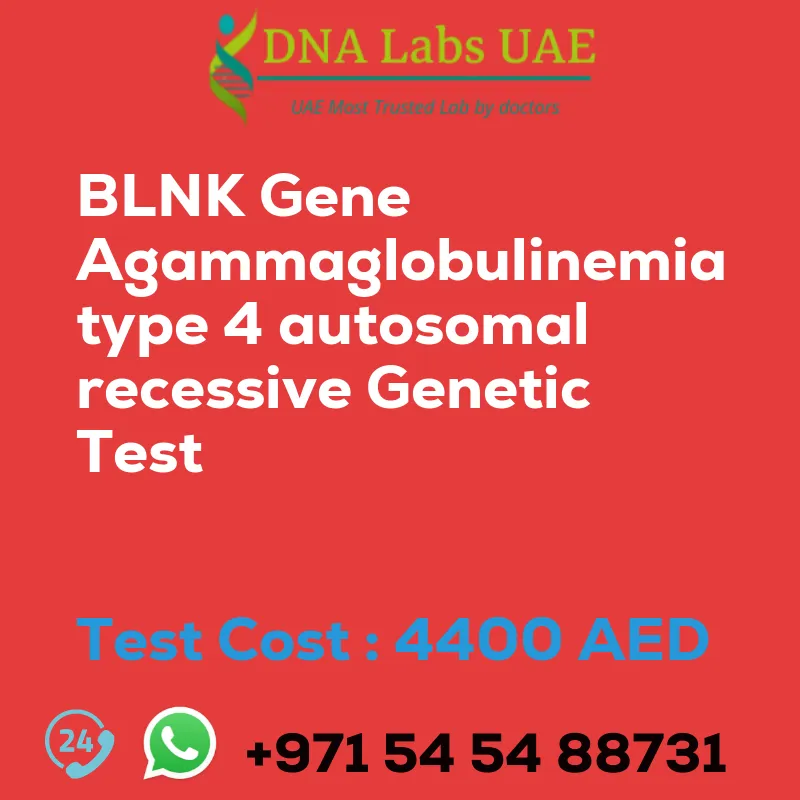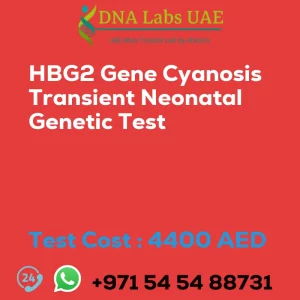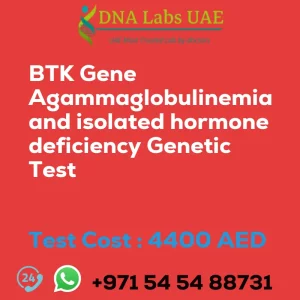BLNK Gene Agammaglobulinemia Type 4 Autosomal Recessive Genetic Test
At DNA Labs UAE, we offer the BLNK Gene Agammaglobulinemia type 4 autosomal recessive genetic test. This test helps diagnose a rare genetic disorder characterized by a deficiency of B lymphocytes and a lack of antibodies, resulting in a weakened immune system.
Test Details
The BLNK gene agammaglobulinemia type 4 is inherited in an autosomal recessive manner. This means that an affected individual must inherit two copies of the mutated gene, one from each parent, to develop the condition. Our NGS (Next-Generation Sequencing) genetic testing method allows us to analyze multiple genes simultaneously and identify mutations in the BLNK gene responsible for the disorder.
Components
- Test Name: BLNK Gene Agammaglobulinemia type 4 autosomal recessive Genetic Test
- Price: 4400.0 AED
- Sample Condition: Blood or Extracted DNA or One drop Blood on FTA Card
- Report Delivery: 3 to 4 Weeks
- Method: NGS Technology
- Test Type: Hematology
- Doctor: Hematologist
- Test Department: Genetics
Pre Test Information
Prior to the BLNK gene agammaglobulinemia type 4 genetic test, it is important to provide the clinical history of the patient. A genetic counseling session may be conducted to draw a pedigree chart of family members affected by the disorder and to determine the need for genetic testing.
How the Test Works
The BLNK gene agammaglobulinemia type 4 genetic test requires a sample of the patient’s DNA, usually obtained through a blood or saliva sample. Next-Generation Sequencing (NGS) technology is then used to sequence the DNA and detect any genetic variations or mutations in the BLNK gene. These mutations can confirm a diagnosis of BLNK gene agammaglobulinemia type 4 and provide information about the specific genetic changes causing the disorder.
Benefits of Genetic Testing
Genetic testing for BLNK gene agammaglobulinemia type 4 can be beneficial for individuals with symptoms suggestive of the condition and for family members at risk of carrying the mutated gene. It can help with accurate diagnosis, genetic counseling, and management of the disorder. However, it is important to consult with a healthcare professional or genetic counselor as genetic testing may not be available in all healthcare settings.
| Test Name | BLNK Gene Agammaglobulinemia type 4 autosomal recessive Genetic Test |
|---|---|
| Components | |
| Price | 4400.0 AED |
| Sample Condition | Blood or Extracted DNA or One drop Blood on FTA Card |
| Report Delivery | 3 to 4 Weeks |
| Method | NGS Technology |
| Test type | Hematology |
| Doctor | Hematologist |
| Test Department: | Genetics |
| Pre Test Information | Clinical History of Patient who is going for BLNK Gene Agammaglobulinemia type 4, autosomal recessive NGS Genetic DNA Test. A Genetic Counselling session to draw a pedigree chart of family members affected with BLNK Gene Agammaglobulinemia type 4, autosomal recessive NGS Genetic DNA Test gene BLNK |
| Test Details |
BLNK gene agammaglobulinemia type 4 is a rare genetic disorder characterized by a deficiency of B lymphocytes (a type of white blood cell) and a lack of antibodies, leading to a weakened immune system. It is inherited in an autosomal recessive manner, meaning that an affected individual must inherit two copies of the mutated gene (one from each parent) to develop the condition. NGS (Next-Generation Sequencing) genetic testing is a type of genetic testing that uses advanced sequencing technologies to analyze multiple genes simultaneously. In the context of BLNK gene agammaglobulinemia type 4, NGS genetic testing can be used to identify mutations in the BLNK gene that are responsible for the disorder. NGS genetic testing for BLNK gene agammaglobulinemia type 4 involves obtaining a sample of the patient’s DNA, usually through a blood sample or saliva sample. The DNA is then sequenced using NGS technology, which allows for the detection of genetic variations or mutations in the BLNK gene. These mutations can help confirm a diagnosis of BLNK gene agammaglobulinemia type 4 and provide information about the specific genetic changes causing the disorder. Genetic testing for BLNK gene agammaglobulinemia type 4 can be beneficial for individuals who have symptoms suggestive of the condition, as well as for family members of affected individuals who may be at risk of carrying the mutated gene. It can help with accurate diagnosis, genetic counseling, and management of the condition. However, it is important to note that genetic testing may not be available in all healthcare settings and should be discussed with a healthcare professional or genetic counselor. |








